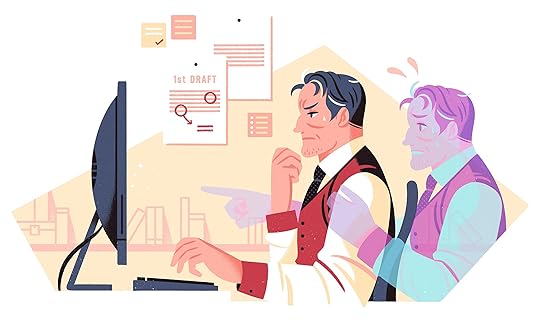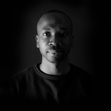Kern Carter's Blog, page 137
October 5, 2020
This Love Found Me Unconventionally
 Photo by Thought Catalog on Unsplash
Photo by Thought Catalog on UnsplashI patted my pink apron flat as I waited in line to present my person for Black History Month. My white collared shirt was pressed to perfection. Mama wanted me to look good. It was a rainy day in third grade and despite my shyness I was thrilled to share with the class who I “was.”
“I am Phyllis Wheatley [Peters].”So proud, so loud. Louder than I’d ever spoken. There was something about this woman (1753–84), who was enslaved and the first Black woman to publish a book of poems (second woman, period, might I add), that undoubtedly entranced me. Nothing in the world made me feel more powerful at that age than “girl power” or seeing Black women do cool shit.
Somehow my mom and I found access to some of her poems and we read them. I didn’t know then, but I knew something about poetry was going to be my saving grace.
I tried my hand at my own poems on my dad’s beat up desktop. I was a mini Phyllis Wheatley Peters in my mind. Poetry was a medium where I could talk about secrets without talking about secrets. My tween “esoteric knowledge” was reminiscent of a Moesha journal entry, but I was so encouraged to write, no one would stop me from it.[1]
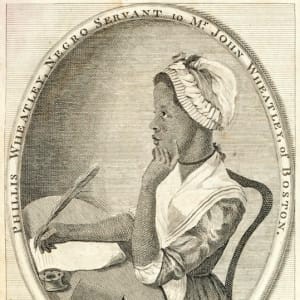 Courtesy of Biography.com
Courtesy of Biography.comSoon after my embodiment of Phyllis Wheatley Peters, I was writing…songs, poems, over the soulful croons of Donny Hathaway and Mariah Carey falsettos. Another love had taken over for me, music.
 Me to the left on celloMusic wasn’t just a passing fancy. It was an escape. All the lonely parts of me that never felt accepted were safe with music.
Me to the left on celloMusic wasn’t just a passing fancy. It was an escape. All the lonely parts of me that never felt accepted were safe with music.Solace found its way to me through music and as my ears grew attuned to multiple voices, tones I would hear, I wrote about it all. History, instruments, people, you name it, I wrote about it and took hella notes. My notebooks remain on my bookshelf telling stories about me doing the shit I love, before I “did” what I love.
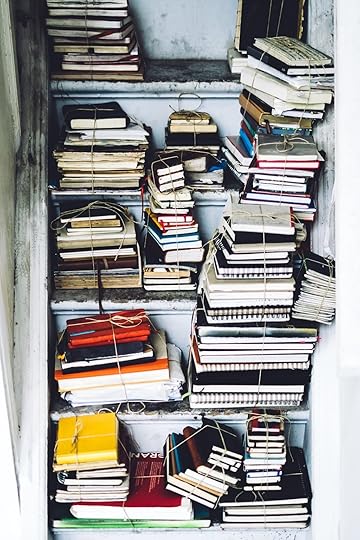 Photo by Julia Joppien on Unsplash
Photo by Julia Joppien on UnsplashWriting about music was not my first career aspiration, hell not even writing. My own mom thought I would be a biology major in college (*cackles* jokes on her). After some detours from forensic scientist and opera singer to lawyer and architect, I landed on African American Studies and Anthropology.
Many if not all of the essays I wrote were about hip-hop music culture. Whether it was ethnographic or historical, didn’t matter, I was constructing stories about hip-hop music culture with attention to gender identity and expression. Then I thoughtlessly decided to attend graduate school for Musicology.
While these educational moments and pursuits made me love writing, interviewing people, and talking about music, this isn’t what sticks out in my journey as “thee moment.”“Thee moment” I really understood how much I dug writing encompassed me…
Hurriedly skirting between venues and shows watching people perform poetry. These folks were MC’s, moving the crowd and holding them at the edge of their seats. I loved it so much.
The time had come for me to open mouth. Sitting on over 10 years of poems was doing me no good. So, I arrived at a talent show at the College of Charleston and decided to shed light on my depression, new found love, familial pain, and much more. My nerves were tap dancing. You can’t convince me I was not up their naked. In fact, sweat still collects under my armpits every time I have to publicly speak, but I read anyway.
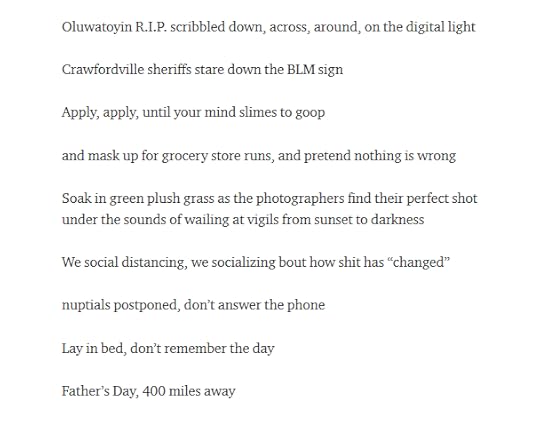 A more recent poem. Can’t find the old one.
A more recent poem. Can’t find the old one.Then, I see the crowd move. The Ooo’s, ahh’s, and uncertain silences leave my senses overwhelmed, teeming. I knew from that point on, I could never leave writing or writing poetry alone.
Knowing that what I write, I can share and that in sharing it, it can rile someone’s emotions (positive or otherwise) brings me joy. I love that sense of power. And while my realization of how much I love writing was not typical, every moment and mishap was worth the trouble.
What do you love to do? What’s the story behind it?
Current writing venture: my music Instagram AfroAtonality.
[1] Also, shout out to my grandma, Donna Jean. I didn’t know for a while that she was a writer and writing was DOPE AF. #BlackPride

This Love Found Me Unconventionally was originally published in C.R.Y on Medium, where people are continuing the conversation by highlighting and responding to this story.
October 3, 2020
CRY is a global community — thank you
It’s so incredible to know that CRY is connecting with writers and creatives from all around the world. I don’t know what I expected when I started, but I’m glad this is what it’s turned into.
INSECURITY: THE GREAT COMPANION OF THE WRITER
The joy I feel when we receive a submission or get a clap or one of you takes the time to comment; it’s hard to put the emotions into words. It’s really a dream come true to have a platform where we can all navigate the emotions of our creative journeys.
This week alone, our stories ran the spectrum from insecurity to feeling like an imposter to pizza bagels. Yes, I said pizza bagels. You’ll have to read it to understand.
THE GUITAR: BACH TO BOSSA
I wanted to take this moment to thank you for continuing to engage with us. We’re proud of what we’re building and will continue to keep pushing forward.
EYE CONTACT AND PIZZA BAGELS

CRY is a global community — thank you was originally published in C.R.Y on Medium, where people are continuing the conversation by highlighting and responding to this story.
October 2, 2020
Insecurity, the Great Companion of the Writer
The Guitar: Bach to Bossa
 Back in the day — Photo: Lawrence Brissenden
Back in the day — Photo: Lawrence BrissendenMy offering was a Gavotte. I sat low on my chair, left foot on the 6 inch metal footstool, nylon-stringed guitar cradled between my thighs. Before me was a music stand and a thin white book opened to page 7. Perhaps my cousin had expected something more familiar, like a Calypso. As I played the piece by J.S. Bach, she twisted up her face, saying “What is that?!” I watched her turn away laughing. I hung my head in disappointment and humiliation. I was 8 years old. I quietly got up and closed the door to my room, inviting no one else into my world of classical guitar for the next 10 years.
My bedroom shared a wall with the grey concrete sink in the backyard. Outside as she did every Wednesday, Gwendolyn the washerwoman squeezed and scrubbed the week’s clothes on a gray aluminum washboard. Dawn, the sway-backed Alsatian, panted close by in a spot of shade. An Indian man swung his cutlass attached at right angles to a thick wooden stick in circles over his head. Slashing around the shaddock, coconut and banana trees, he expertly willed the patchy grass to exactly 1.5 inches above the ground. I played on inside my room, a safe distance away, etudes and gavottes wafting around my head.
***
My first guitar had been a steel-stringed beast. Obzukee is the word that would aptly describe it. It had an inexplicably thick neck that made it hard for me to place my thumb and stretch my little fingers around to the frets on the front. My father had hired Mr. Sonny Denner to come to the house each week to teach me. He was a former jazz guitarist who’d been down on his luck since the big bands of the 50’s and 60’s had shut down. It was now 1970.
Music was a part of my family legacy, as both grandfathers had been choir masters. One had taught in Trinidad where we lived, the other on the second island of the twin nation, Tobago. Music lessons were sacrosanct. Mr. Denner would arrive at our house in a suit and tie and we would be set up with two hard-backed chairs in a corner of the living room. While my brothers and parents tip-toed around the wooden colonial house in the neighbourhood of Belmont, my fingertips would develop deep groves and turn purple, as the lessons wandered into the two-and-a-half hour range. In desperation, I would ask Mr. Denner to explain, to play the piece a few more times, to give my fingers some respite from the taunt steel strings. I would watch his hands with deep attention and memorize the shapes his fingers made. I would then play back a mirror image of what I’d seen, while looking meaningfully at the sheet of music. I never learned to read music well.
I was handed a new guitar later that year. It was made by Mr. Jules Louis, the luthier from around the corner on Gloselodge Road. The strings were nylon and soft. I no longer needed to ask my teacher to talk and play, but the pattern was set. I continued to use the same Bare Minimum Method of reading on increasingly challenging pieces. I’d scan a manuscript in a general fashion, noting keys, codas and tempos. I had long slim fingers that landed precisely on the appropriate frets at the appropriate times. I always delivered.
In high school in North Bay, Ontario, Canada, my guitar teacher was Steve, a bespectacled young white man with curly black hair and a sweet smile. He accommodated my requests to play through the songs repeatedly, as I secretly memorized his finger movements. He said that I was his most talented student, which made me wonder who the other students were and could they not read well either?
Years later, while pursuing a science degree, I took private guitar lessons with Eli, another bespectacled musician who smelled faintly of cigars. “You should audition for the Music Faculty,” he announced one day. He turned briefly to smile at his sleepy wife, who always just emerging from the bedroom rubbing her eyes and stretching. “You’d get in,” he stated. I froze at the suggestion. Switch from science to music? I knew that pursuing a degree in music would be zero sum game with my professional Caribbean family. Yes, music was revered, however my dad had often told me that to succeed in this world, I — the Black person — would have to work ten times as hard as everyone else — White people. I knew that he did not mean, practice ten times more scales on the classical guitar. Making a living was also revered and this music business was not a great money-making prospect. My family had always surmised that my extended childhood lessons were due to the fact the Mr. Denner was waiting for my mother to finish cooking dinner, and invite him to join us for what was perhaps the only meal of his day.
In addition, I knew that an audition would be well, an audition — in front of people. As I’d spent most of my 18 years playing in my room, the prospect of a performance, even for 1 or 2 music faculty, was terrifying. My classical guitar duet partner, Monica, an English literature major from Berlin understood me completely. We would file our nails with ascending gauges of sand paper from the hardware store while discussing right hand technique. We played our Frances Couperin duet repeatedly with the great feel and dynamics in each other’s dormitory rooms. We entertained the idea of performance, as one would glance sideways at a strange phenomenon that could not hold our interest.
***
Years later, I sat at Future Bakery on Bloor Street, Toronto — a small glass of amber coloured beer cradled between my shaking hands. I was preparing to walk a few blocks east to Huron Street, where I would perform Canzonetta by Felix Mendelssohn at Fat Albert’s — an open stage. My hands would shake as I played and yet I returned each week to Fat Albert’s with a perverse determination to share my abilities. Before each performance, I had a glass of beer. This was sometimes accompanied by cake. Eventually, surrounded by poets and songwriters, I began to write my own poems and songs. Fellow songwriter, Sam Larkin, upon hearing of my pre-performance bakery routine, gave me this piece of advice.
“If you keep that up, you will always need alcohol to play. Stop.” I did.
Over the next 10 years, I wrote more songs, and as a singer, bandleader and guitar player, I played many shows across Canada, and a few south of the border. I recorded. I can’t imagine how I kept it up. Nervousness never left me. I’d been raised on the gentle climes of solo classical guitar, sequestered in my childhood room, in a tradition where each note, each breath was written down. At my performances, I would become somewhat untethered by the need to improvise, with the requirement that I speak and not just play. Each event was hard. Very hard.
So why perform? Maybe it was an act of resilience, repeatedly pulling my gifts out from behind the bedroom door. After giving birth to my daughter, however, I put performance aside with a kind of relief. I did try to complete a second full-length album in the studio. With a 5 month old baby girl in arms, however, it didn’t work out. I’m in great company though. Doesn’t every musician have an unfinished album in their closet?
While raising my daughter, I held my experiences close and dear. Our nature, our very self, can’t be rationalized away. It also can’t be hidden. I watched for who she might be. She’s very good at math. She also dances. She plays the violin marvelously and reads music very, very well. I gave her what I was not easily offered — the option to fall deeply in love with art.
I’ve learned that I don’t have to perform. It is not in my nature. I also don’t have to silo myself away for emotional safety. I’ve found the happy medium, a place of comfort and joy. I pick up my guitar again these days and set it between my legs. Europe’s Bach and Mendelssohn no longer hold my attention. I’ve wandered into the Afro-Brazilian world of Samba and I will strum through a bossa nova most evenings. My classical guitar technique serves me well, right hand keeping time with the surdo and tamborim, left hand still landing on the right strings and frets at the right time.
I still play in my room. The door is open though and if asked nicely, I might invite you in.

The Guitar: Bach to Bossa was originally published in C.R.Y on Medium, where people are continuing the conversation by highlighting and responding to this story.
October 1, 2020
From Dust to Delight
September 30, 2020
Why are big publishing companies crowdfunding?
When I think of crowdfunding, I think of two things: an independent creative looking to get support for their work or someone in need of funds to deal with a tragic event. Since this is CRY, the former is what we’ll discuss.
Because now it’s not just independent artists on crowdfunding platforms. Big publishers, particularly in the comic world, are turning to crowdfunding as a way to reach new audiences for their authors. They use it almost as a preorder platform that’s more-so about discovery than it is about “traditional” crowdfunding.
Some people in the industry are OK with it. As long as it helps authors sell more books, then great. Others aren’t as welcoming. They see big publishers and immediately feel like they’re intruding on sacred space.
I’m OK with it. I think publishers need to get more creative with how they promote authors and this is a way to do it. I always think it’s cool when brands use platforms in unexpected ways or choose platforms that aren’t immediately obvious. And as an author myself, I know that nothing is guaranteed. So if crowdfunding introduces writers to new readers, I’m all for it!

Why are big publishing companies crowdfunding? was originally published in C.R.Y on Medium, where people are continuing the conversation by highlighting and responding to this story.
Reawakening my Love for Writing
Writing — with power & intention — helped me to see the truth in myself before I ever respected these art forms for what they were.

Every day after school I would run up to my mother’s room and plop myself down into a seat facing the only computer in our home, to continue working on poems and stories I had started days before.
I would get lost in the world of writing for hours.
Every summer, we would board a Greyhound bus to visit my cousins in Brampton, Ontario and I would spend the 4-day trip scribbling rhymes in my notebook.
EVERY YEAR, the students in my elementary school could expect to see a young black boy ecstatic to be performing legendary rap songs like “Can’t Touch This” in the annual talent show.
Perhaps it was the ‘Chicken Soup for the Soul’ books I spent so much time reading that first showed me the power in thoughts, emotions, and aligned actions.
I’ve always seen storytelling as a source of power to tap into whenever I needed inspiration.
Whenever I didn’t believe there was a way out or didn’t surrender to the fantasies of imagination — stories would always bring me home and show me the truth.
Subconsciously, I had created an attachment with writing that served as a safe haven. No matter what challenges made me feel stagnant and confused or responsibilities that made me feel unworthy and ill-equipped; putting that pen to paper provided the slightest seam to slip through and create a new, empowering understanding of my circumstances.
Holding that pen was like wielding a sword for me.
That’s how I knew it would stay with me my whole life. The writing that is, not the sword.
Losing TouchAs I transitioned to adolescence, I picked up a different sword. Sports, football, in particular, would now be fighting chance for glory and also my refuge.
I began to see writing as a whimsical hobby that now needed to be replaced with as much work that could fill my schedule. If I were going to make it professionally, I needed to pour all my energy into football. So, for 10 years, I said goodbye to writing.
Throughout this period of time, I kept my emotions bottled up. I didn’t express myself the way I so naturally loved to as a child. Instead, I was filled with anger, guilt, and intense sorrow that I refused to show to the world.
But the funny thing about passion is that it never leaves you. In fact, it finds and empowers you when you need it the most.
After a breaking point that resulted in violence and isolation, I decided to dive into my notebooks as I once used to. All my pent up emotions flowed out of me and onto the page, creating poetic narratives around my life story.
When I read these creations aloud, it instilled a sense of power within me that I hadn’t felt in so long I felt nervous handling it.
“Is this too vulnerable of me to say?”
“Do I sound too cocky talking this way?”
These questions of “being too much” for the adult world swirled in my mind and almost prevented me from sharing my art with a broader audience.
It was the courage to stand in my truth and encourage others to do the same, that pushed me to the stage.
It was the respect I had gained for myself, my journey, and my craft that bestowed me with perseverance.
And it was the unexpected confirmations from others (and God/The Universe) that helped me to accept this craft as an integral part of my purpose.
Approach the TrailArt, in any form, is a very deep practice that requires the truth from all who participate. If we can’t sit with the truth, our art will become skewed and inauthentic.
Art brings the artist to the bounds of their perceived limitations and leads us through a journey transformation.
Art asks us to walk into the unknown and create a way out.
It reminds us that at all times, we have our creative ability to bring light to where there is darkness.
Art restores any lost trust within ourselves.
Therefore, trust is the ultimate virtue of reawakening the Creator power we all hold within.
Writing is the first step to harnessing it.

Reawakening my Love for Writing was originally published in C.R.Y on Medium, where people are continuing the conversation by highlighting and responding to this story.
September 29, 2020
Eye Contact And Pizza Bagels
A simple 2nd grade assignment taught me how to send my words out into the world when it was too difficult to go out myself.
September 28, 2020
Lies we tell ourselves
Call for submissions — When did you fall in love with your art
I’ve always loved writing, but I think the moment I fell in love with it was when I started writing my first book. I remember feeling so energized when I woke up in the morning and flipped open my laptop. That energy was love and I knew right then that I didn’t want to do anything else with my life.
But what about you? When was the first time you fell in love with writing or designing or whatever your creative medium of choice may be? How did you know that that thing would forever be part of your life? Describe the emotions and where you are now with your feelings towards your art.
Same rules as always:If you’re already a writer for CRY, go ahead and submit.If you’re not a writer for CRY but would like to submit to this request, let us know and we’ll add you ASAP.Be as creative as you want in your submissions. As long as you stick to the topic, we’ll consider it.Just because you submit doesn’t mean we’ll post. If you haven’t heard back from us in three days, consider that a pass.Deadline to submit is Friday, October 2.Please reach out if you have any questions at all. If you are new to Medium, here’s how you submit a draft to a publication.

Call for submissions — When did you fall in love with your art was originally published in C.R.Y on Medium, where people are continuing the conversation by highlighting and responding to this story.

